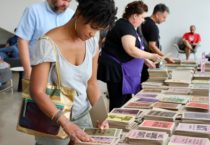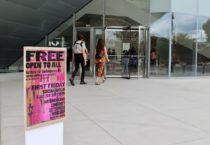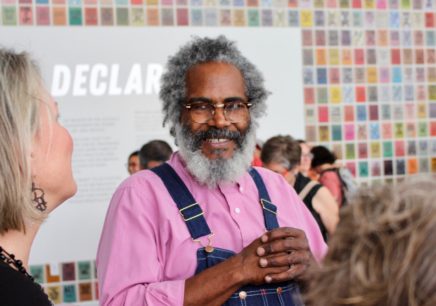Installation view, Passin' on to others, Institute for Contemporary Art, Richmond, Virginia, 2018. Photo: Terry Brown


Installation view, Passin' on to others, Institute for Contemporary Art, Richmond, Virginia, 2018. Photo: Terry Brown


Tony and Martina Turner, Unleashed the Salon. Image courtesy of Robin Boone, Richmond Free Press


Installation view, Passin' on to others, Institute for Contemporary Art, Richmond, Virginia, 2018. Photo: Terry Brown


Installation view, Passin' on to others, Institute for Contemporary Art, Richmond, Virginia, 2018. Photo: Terry Brown


Tony and Martina Turner, Unleashed the Salon. Image courtesy of Robin Boone, Richmond Free Press


Installation view, Passin' on to others, Institute for Contemporary Art, Richmond, Virginia, 2018. Photo: Terry Brown


Amos Paul Kennedy, Jr.
PASSIN’ ON TO OTHERS
Passin’ on to others is a new multi-site project produced by Kennedy Jr. in collaboration with barbershops and salons around Richmond. Over many months, these business owners gathered words and phrases, proverbs and aphorisms from their patrons and stylists and passed them on to Kennedy, Jr. He typeset and produced hundred of letterpress prints, combining their words with bright color and pattern. The resulting prints then formed a large installation at the ICA and ten smaller installations in downtown Richmond and the Jackson Ward, Northside, and Southside neighborhoods.
The installations at the barbershops and salons consist of proverbs and aphorisms generated at each business by its owner, stylists, and patrons. The ICA’s installation presents submissions from all the participants, along with the artist’s own words.
The project creates a bridge to the ICA’s neighbors while honoring barbershops and salons as historic cornerstones for communities, conversation, and entrepreneurship. It acknowledges the integral role that barbershops and salons have played in communities, particularly African American communities since the turn of the 19th century. These sites function as spaces for social refuge, political mobilization and action, and the passing down of knowledge from generation-to-generation. Together these installations, produced from the words of Richmond citizens, reflect the strength, love, and resilience within these historic spaces.
ON VIEW
Passin’ on to others, 2017–2018. Letterpress prints. Courtesy of the artist and community collaborators.
LOCATION
Royall Forum, Beverly Reynolds Gallery 1, and barbershops and salons around Richmond



“Printing allows for declarations to be distributed to the masses. Declarations are about the redistribution of power. —Amos Paul Kennedy Jr.
WHAT MOTIVATES YOU AS AN ARTIST?
Paying my monthly bills.
PLEASE SHARE A BRIEF DESCRIPTION OF THE WORK YOU’RE SHOWING IN DECLARATION.
A bunch of 6 x 8 inch chipboard cards with the wisdom of the communities printed on them. All the text is hand set metal and wood type printed by the letterpress method.
DO YOU BELIEVE ART HAS SOCIALLY TRANSFORMATIVE POWER?
Creating is a transformative power. The results of creating are also transformative. The questions is the impact of the transformation…is it truly progress?
B. 1950, Lafayette, Louisiana; Lives in Detroit, Michigan
Kennedy is a self-proclaimed “humble Negro printer” whose letterpress work represents the messages and identities of African-Americans whose “words… have largely been excluded from ‘fine print.'” He uses traditional letterpress techniques to create richly colored, hand-pulled prints that often incorporate messages and aphorisms that spur conversation about race and class. Through his fine, layered printing of simple text using traditional letterpress technique, Kennedy’s work encourages reflection on historical and current African-American identities and overlap between the struggles of the Civil Rights movement and contemporary needs for bold action to pursue social justice.
Kennedy received a BA in Mathematics from Grambling State University in Louisiana and his MFA in Graphic Design from the University of Wisconsin-Madison. His recent awards include a Joyce Award (2016–17), and in 2015 United States Artists named him the USA Glasgow Fellow.
Select solo exhibitions include Museum of Modern Art in New York (2017); Brooklyn Public Library (2017); Kennedy Art Museum, Ohio University in Athens, Ohio (2014); Northeastern Illinois University in Chicago, Illinois (2014); La Stamperia del Tevere in Rome, Italy (2010); Point Jaune Museum in St. Gallen, Switzerland (2010); Select group exhibitions: Freedom Rides Museum in Montgomery, AL (2012); Columbia College Chicago Center for Book and Paper Arts in Chicago, Illinois (1995); and Minnesota Center for Book Arts in Minneapolis, Minnesota (1994). Collections include: Library of Congress, Washington D.C., Charles Deering McCormick Library, Northwestern University, Evanston, Illinois, Manuscript Archives and Rare Book Library, CA Kohler Art Library, University of Wisconsin-Madison, and The Rare Book and Manuscript Library, University of Illinois at Urbana-Champaign.

 Closed
Closed
 10 AM-4 PM
10 AM-4 PM

 Area Map
Area Map  Parking
Parking